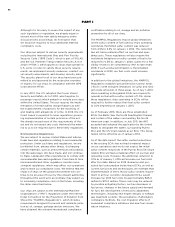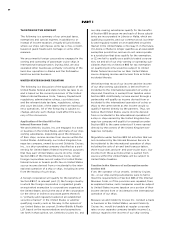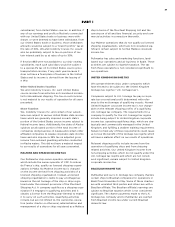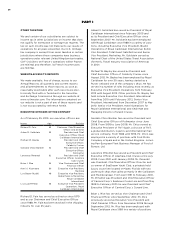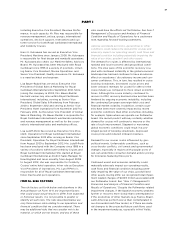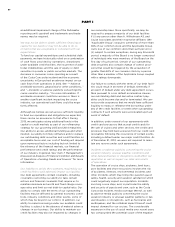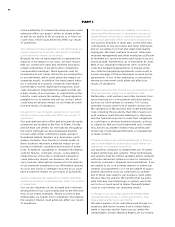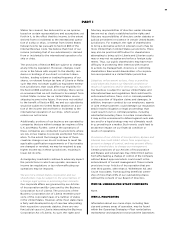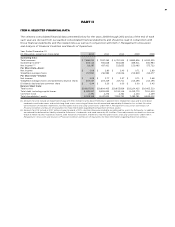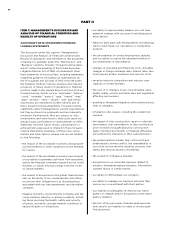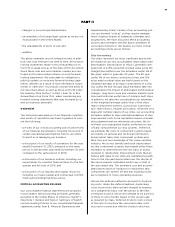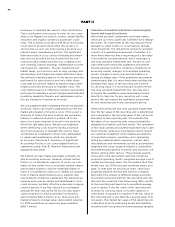Royal Caribbean Cruise Lines 2012 Annual Report Download - page 36
Download and view the complete annual report
Please find page 36 of the 2012 Royal Caribbean Cruise Lines annual report below. You can navigate through the pages in the report by either clicking on the pages listed below, or by using the keyword search tool below to find specific information within the annual report.
32
PART I
in the availability of commercial airline services could
adversely affect our guests’ ability to obtain airfare
as well as our ability to fly our guests to or from our
cruise ships which could adversely affect our results
of operations.
Our reliance on travel agencies to sell and market our
cruises exposes us to certain risks which, if realized,
could adversely impact our business.
Because we rely on travel agencies to generate the
majority of bookings for our ships, we must ensure
that our commission rates and incentive structures
remain competitive. If we fail to offer competitive
compensation packages, these agencies may be
incentivized to sell cruises offered by our competitors
to our detriment, which could adversely impact our
operating results. In addition, the travel agent indus-
try is sensitive to economic conditions that impact
discretionary income. Significant disruptions, espe-
cially disruptions impacting those agencies that sell
a high volume of our business, or contractions in the
industry could reduce the number of travel agencies
available for us to market and sell our cruises, which
could have an adverse impact on our financial condi-
tion and results of operations.
Disruptions in our shoreside operations or our infor-
mation systems may adversely affect our results of
operations.
Our principal executive office and principal shoreside
operations are located at the Port of Miami, Florida
and we have call centers for reservations throughout
the world. Although we have developed disaster
recovery and similar contingency plans, actual or
threatened natural disasters (e.g. hurricanes, earth-
quakes, tornados, fires, floods) or similar events in
these locations may have a material impact on our
business continuity, reputation and results of opera-
tions. In addition, substantial or repeated information
systems failures, computer viruses, cyber-attacks
impacting our shoreside or shipboard operations
could adversely impact our business. We do not
carry business interruption insurance for the majority
of our shoreside operations or our information systems.
As such, any losses or damages incurred by us could
have an adverse impact on our results of operations.
Failure to develop the value of our brands and differ-
entiate our products could adversely affect our results
of operations.
Our success depends on the strength and continued
development of our cruise brands and on the effective-
ness of our brand strategies. Failure to protect and
differentiate our brands from competitors throughout
the vacation market could adversely affect our results
of operations.
The loss of key personnel, our inability to recruit or
retain qualified personnel, or disruptions among our
shipboard personnel due to strained employee rela-
tions could adversely affect our results of operations.
Our success depends, in large part, on the skills and
contributions of key executives and other employees,
and on our ability to recruit and retain high quality
employees. We must continue to recruit, retain and
motivate management and other employees sufficient
to maintain our current business and support our pro-
jected growth. Furthermore, as of December 31, 2012,
80% of our shipboard employees were covered by
collective bargaining agreements. A dispute under
our collective bargaining agreements could result in
a work stoppage of those employees covered by the
agreements. A loss of key employees or disruptions
among our personnel could adversely affect our
results of operations.
Business activities that involve our co-investment with
third parties may subject us to additional risks.
Partnerships, joint ventures, and other business struc-
tures involving our co-investment with third parties,
such as our joint venture to operate TUI Cruises,
generally include some form of shared control over
the operations of the business and create additional
risks, including the possibility that other investors in
such ventures could become bankrupt or otherwise
lack the financial resources to meet their obligations,
or could have or develop business interests, policies
or objectives that are inconsistent with ours. In addi-
tion, actions by another investor may present addi-
tional risks of operational difficulties or reputational
or legal concerns.
A failure to keep pace with developments in technol-
ogy or technological obsolescence could impair our
operations or competitive position.
Our business continues to demand the use of sophis-
ticated technology and systems. These technologies
and systems must be refined, updated, and/or replaced
with more advanced systems in order to continue to
meet our customers’ demands and expectations. If we
are unable to do so in a timely manner or within rea-
sonable cost parameters or if we are unable to appro-
priately and timely train our employees to operate
any of these new systems, our business could suffer.
We also may not achieve the benefits that we antici-
pate from any new technology or system, and a fail-
ure to do so could result in higher than anticipated
costs or could impair our operating results.
A change in our tax status under the United States
Internal Revenue Code, or other jurisdictions, may
have adverse effects on our income.
We and a number of our subsidiaries are foreign cor-
porations that derive income from a United States
trade or business and/or from sources within the
United States. Drinker Biddle & Reath LLP, our United


